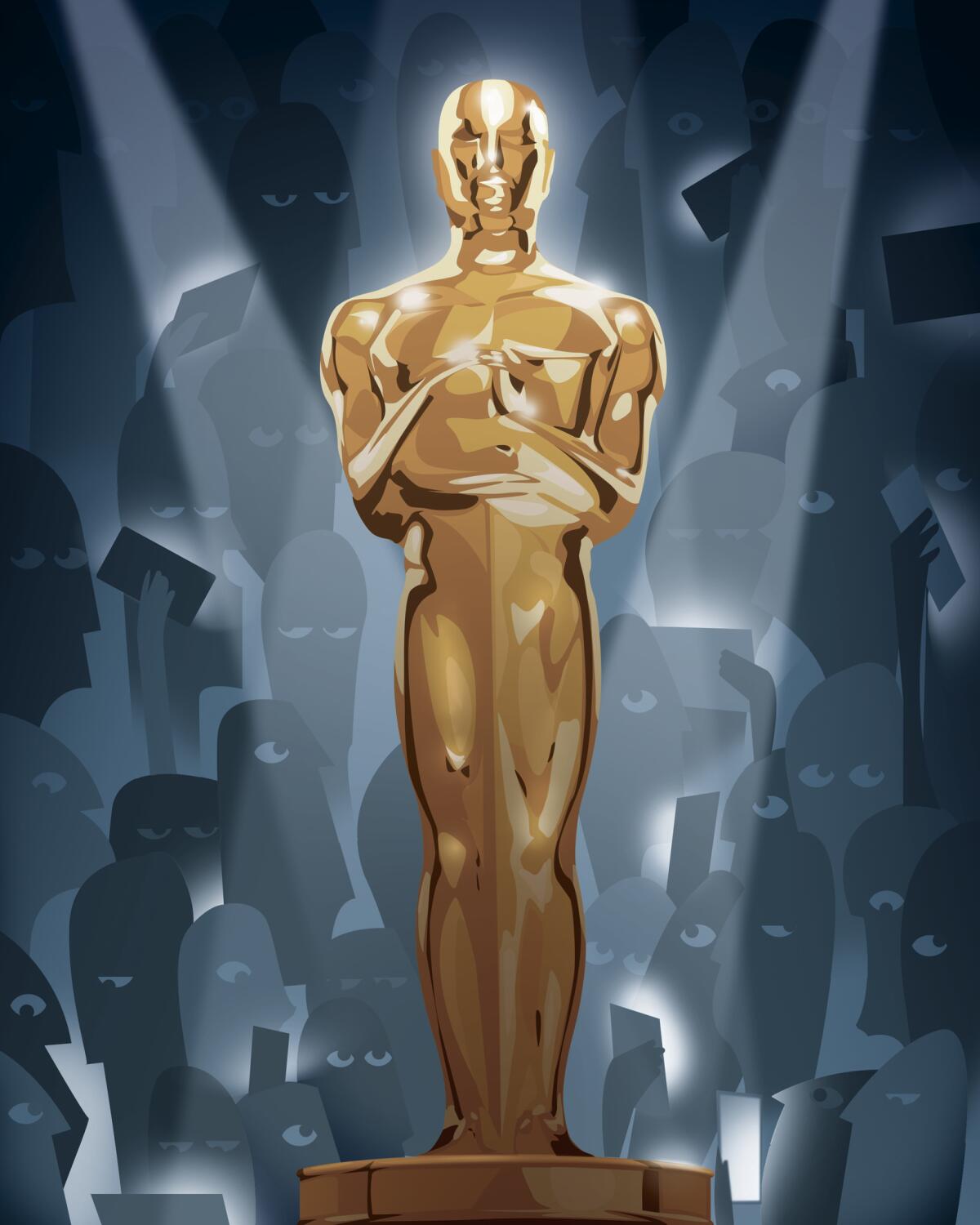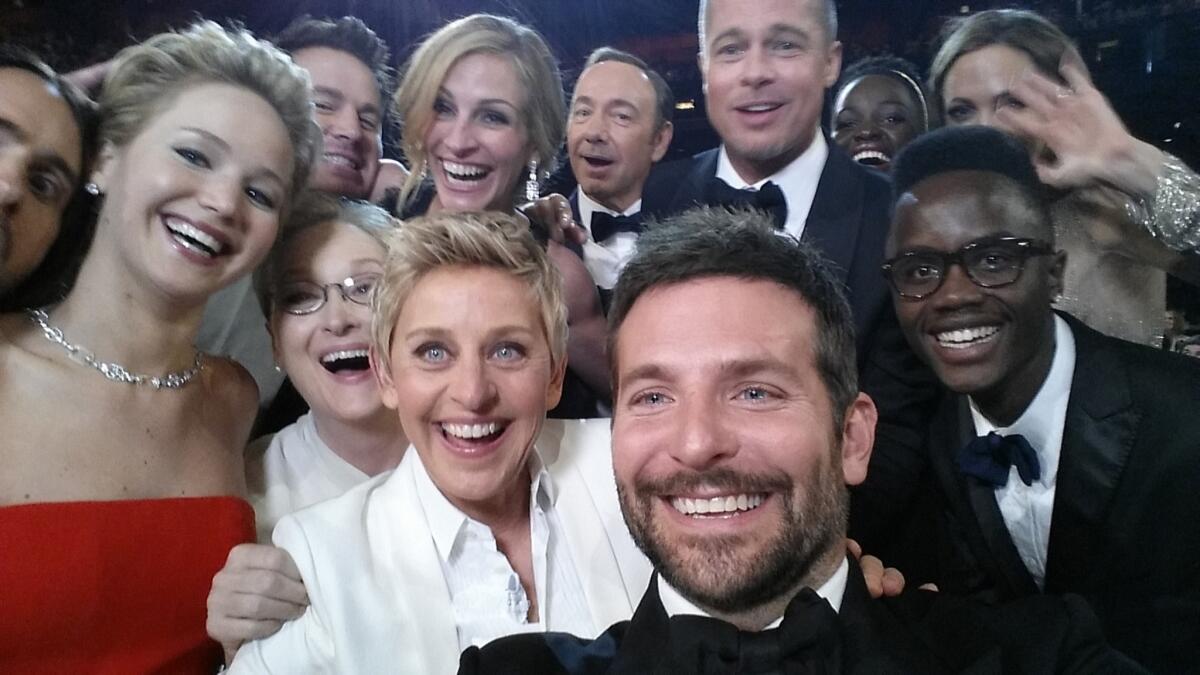Column: Why the Oscars have become more important even as viewership has shrunk

Quite a few people were unhappy with a column I wrote in which I suggested that the film academy’s recent decision to present Oscars in four categories during the commercial break was not a cataclysmic crime against cinema.
Those who were not busy signing their names to letters calling for the academy to reverse its decision, which it eventually did, wrote me, many protesting that in their zeal to improve telecast ratings, the Oscars producers had lost sight of its purpose. (Which, according to several readers, is to educate audiences about how films are made. Who knew?)
This is patently absurd: If handing out Oscars during commercial breaks would improve ratings, that change would have been made years ago. (Though it certainly would be nice if this year’s producers could, as they have promised, keep the show to three hours or, failing that, book Beyonce for the half-time entertainment.)
It will be interesting to see how many folks tune in this year. If conventional wisdom holds, multiple nominations for “Black Panther,” “A Star Is Born” and, God help us, “Bohemian Rhapsody” should kick the numbers out of last year’s all-time low of 26.5 million.
And there’s a chance that some will watch just to see how in the hell this is going to work without a host. (Billy Crystal recently told James Corden that he thought a host-less Oscars could be great, and I think we should keep an eye on both their GPS trackers to see if they’re making their way anywhere near the Dolby Theatre this week, because wouldn’t that be AMAZING?)
A gain of 10 million would put this year’s show within spitting distance of the average since 2008 (which, at 32 million, was the previous low); in 2014, Oscar ratings hit almost 44, but then Ellen DeGeneres was hosting. (And where exactly is she this week?)

FULL COVERAGE: Countdown to the Oscars »
But, with apologies to ABC’s ad sales department, it doesn’t matter all that much. Ratings for everything have been falling for years. Yes, the most watched Oscars telecast, 1998, had 55 million viewers (runner-up, 1983 with 50 million), but in 1998, 76 million watched the (monumentally disappointing) “Seinfeld” finale, and top-rated series (including, yes, it’s true, “Veronica’s Closet”) regularly pulled in close to 25 million viewers. In the new TV landscape, no top show breaks 20 million; “Mad Men” changed the world and never hit four.
Yet television remains the artistic success story of the second millennium, and the Oscars have never been more socially relevant.
Out of the glamour and the glitz and internal politicking, the Oscars have become an unexpected national touchstone for increasingly energized conversations about racism, sexism, immigration, populism and our place in the international community.
And not in the traditional “celebrity gives controversial acceptance speech and then is denounced by the academy” way. (Remember when Susan Sarandon and Tim Robbins got in trouble for asking the U.S. government to release HIV-positive Haitians from Guantanamo? Or when Paddy Chayefsky mansplained the Oscars to Vanessa Redgrave, who dared use the term “Zionist thugs”?)
Two years of #Oscarssowhite and the continued and dispiriting absence of women in categories, including best director and cinematographer, led to changes in both the makeup of the nominations list and the film academy. Having pledged to double the number of women and minorities by 2020, the group has grown its ranks by 25% in the past three years (though it still remains overwhelmingly white and mostly male).
Two years ago the academy booted former Oscar czar Harvey Weinstein after charges of sexual harassment were made against him by multiple women, and last year expelled Bill Cosby and Roman Polanski for similar reasons. Last year’s telecast included many references to #MeToo and a video salute introduced by three of Weinstein’s accusers.
In 2017, the Iranian director and the lead actress of the winner for best foreign film boycotted the ceremony in protest of the “travel ban.” This year, Mexican actor Antonio Guerrero Martinez, who stars in best-picture nominee “Roma,” had to fight to get a visa to attend the awards, which will occur within two weeks of President Trump declaring a state of “national emergency” at our southern border.
Television remains the artistic success story of the second millennium, and the Oscars have never been more socially relevant.
All of this has changed the way we talk about the Oscars. Yes, it’s still exciting to anticipate all the fabulous dresses and the prospect of yet another rendition of “Shallow.” But this year, a black-and-white paean to the life of a Mexican housekeeper is going up against the first black superhero movie (and the first superhero movie to be nominated for best picture), as well as films about a black man who infiltrated the Klan, a love triangle between an English queen and her female courtiers, and the tragically short life of the bisexual lead singer of Queen.
No matter who wins, and doesn’t, there will be a lot to discuss and those discussions won’t revolve around who “bought” an Oscar with influence, threats or outrageous campaigns. They will be about which stories mattered most to voters and why.
The stories we choose to tell, and then honor, reveal more about who we are than perhaps we have been comfortable admitting in the past. Now those stories are finally expanding in type and teller and meaning. Not just in film, but in every medium (including Medium) available to us.
Ironically, the ensuing competition for eyeballs may be one reason the Oscars have gained larger importance.
Media have become cacophonous, splintered, personalized, overwhelming. The Oscar ratings have fallen in part because everyone now has 178 other things to do or watch or tweet about that Sunday night.
But the Oscars themselves remain a fixed point, easily identified, and even with up to 10 nominees for best picture, ruthless in its winnowing process. (It takes the television academy two nights, with no time for musical numbers, to hand out the Emmys, and the Grammys have a category for everything except best use of a Rolling Stones song in a car commercial.)
The Oscar nominees, and winners, make a statement, about film, yes, but also who we are now and who we want to become, and that statement is now what we talk about, ratings be damned.
That and maybe how cool it was that James Corden, Billy Crystal and Ellen DeGeneres showed up to help host this year.
More to Read
The biggest entertainment stories
Get our big stories about Hollywood, film, television, music, arts, culture and more right in your inbox as soon as they publish.
You may occasionally receive promotional content from the Los Angeles Times.











